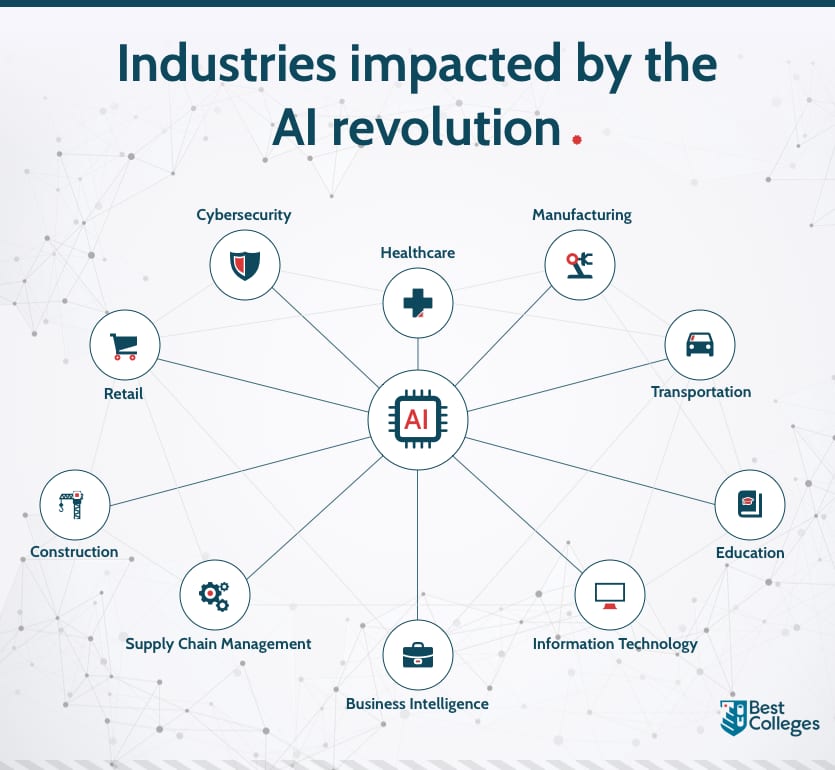- June 14, 2023
- Posted by: Artificial Intelligence Global Institute™
- Category: Uncategorized

Starting a Career in Artificial Intelligence
By
- Artificial intelligence will transform the global economy, and AI jobs are in high demand.
- Getting an education in AI is challenging and requires persistence and personal initiative.
- AI careers are future-proof, meaning they are likely to survive well into the future.
Artificial intelligence (AI) promises to deliver some of the most significant and disruptive innovations of this century. Self-driving cars, robotic assistants, and automated disease diagnosis are all products of an emerging AI revolution that will reshape how we live and work. And with demand for talented engineers more than doubling in the last few years, there are limitless opportunities for professionals who want to work on the cutting edge of AI research and development.
While jobs designing and improving AI applications are growing, some analysts predict these efforts will disrupt economic activity in a big way. This is because AI systems can process unfathomable amounts of data, and human beings — meaning potentially millions of people in today’s job market — simply aren’t up to the task.
Not Sure What You Want To Study?
That’s ok! Find a computers and technology program that lets you try new things and find what inspires you.
![]()
75%of students will change their major at least once.
- Browse Programs
- Discover Results
- Request Information
AI will be a great transformer, improving the efficiency of many sectors … and enabling the creation of higher-value services that can lead to overall economic growth.. Source: — Dan Ayoub, General Manager of Mixed Reality Education at Microsoft
One recent report by the McKinsey Global Institute suggests that around one-third of the American workforce will need to switch occupations by 2030. Workers in data-heavy industries are especially vulnerable, including financial and administrative professionals, legal support staff, sales clerks, and IT workers.
More cautious industry observers point out that it’s unclear what jobs may be lost and how many more will be created. The World Economic Forum, for example, predicts AI may lead to a net increase of 58 million jobs globally.
No matter what the new AI economy means for the future workforce, college students and young professionals stand to benefit from entering this burgeoning field. But breaking into artificial intelligence isn’t as simple as learning computer science or earning a college degree. It takes initiative, guts, and know-how to engineer a career in AI. In fact, more than half of senior AI professionals report there is a skills gap in the recruitment of new scientists — a veritable “talent crisis,” according to an Ernst & Young report.
Getting an AI Education: Intelligence Required
AI has a high learning curve, but for motivated students, the rewards of an AI career far outweigh the investment of time and energy. Succeeding in the field usually requires a bachelor’s degree in computer science or a related discipline such as mathematics. More senior positions may require a master’s or Ph.D., though a college degree is no longer considered a hard requirement by top employers like Apple and Google. Regardless, your success will depend largely on factors outside a formal education.
Curiosity, confidence, and perseverance are good traits for any student looking to break into an emerging field, and AI is no exception.. Source: — Dan Ayoub, General Manager of Mixed Reality Education at Microsoft

“Curiosity, confidence, and perseverance are good traits for any student looking to break into an emerging field, and AI is no exception,” said Dan Ayoub, general manager for mixed reality education at Microsoft. Ayoub is a seasoned AI professional and agreed to talk to BestColleges about how to land a job in the field. “Unlike careers where a path has been laid over decades, AI is still in its infancy, which means you may have to form your own path and get creative.”
What Ayoub means is that there is no standard artificial intelligence degree or curriculum. Some universities may not offer a prescribed set of courses for a major or specialization in AI, while those with dedicated AI programs may have unique approaches to the discipline.
“Because AI is still an emerging field … universities differ in how specialized a degree you may be able to get,” Ayoub said. “A good place to start is computer science coursework, getting familiar with the basics of data science, machine learning, and Java. … There are a number of new undergraduate and graduate programs popping up every day that are designed to prepare someone specifically to work in AI.”
Artificial Intelligence Courses and Curriculum
As the table below demonstrates, AI consists of several overlapping disciplines. Understanding statistical methods, for example, is just as important as a background in computer science. In addition to the subjects listed here, it can be helpful to take interdisciplinary courses in areas like cognitive science to provide a conceptual framework for AI applications.
Sample Core Subjects in an AI Curriculum
| Math And Statistics | Computer Science | AI Core Subjects |
|---|---|---|
|
|
|
| Sources: Carnegie Mellon University; Stanford University; Northwestern University; Learning Artificial Intelligence; Microsoft Professional Program | ||
Once you master some of the fundamentals, find the AI subfields that most interest you and shape your coursework accordingly. The next table shows more specialized subjects you might take as electives while earning a degree; these topics are also worth exploring at any stage of your career. Additional classes may be available that teach students specific AI applications in fields like biology, healthcare, and neuroscience.
Sample Artificial Intelligence Clusters and Subjects
| Machine Learning | Decision-Making And Robotics | Perception And Language | Human-AI Interaction |
|---|---|---|---|
|
|
|
|
| Sources: Carnegie Mellon University; Stanford University | |||
Whether you’re a college student or already in the workforce, it’s important to proactively define your own AI curriculum. As Ayoub explained, “schools like Carnegie Mellon, Stanford, and MIT are just a few that have built out tracks for those wanting to work in AI, but there are many others. There are also supplemental programs that can help someone who is midcareer retrain to move into a job in AI.”
For example, Microsoft recently announced an AI track for the Microsoft Professional Program, which is part of a larger effort that includes the developer-focused AI School. The programs are available online to anyone and, according to Ayoub, provide “job-ready skills and real-world experience to engineers and others who are looking to improve their skills in AI and data science through a series of online courses that feature hands-on labs and expert instructors.”
Machine learning courses and related resources are also available from Google, MIT, Stanford, CalTech, and the University of Cambridge. With soaring demand, universities and big-name companies are eager to provide educational content that can help increase the supply of AI engineers.
Landing a Job in AI: It’s About Initiative

When it comes to the best jobs for the future, few industries stand out as much as artificial intelligence. A 2019 report from Gartner shows that enterprise applications for AI have grown 270% in four years, fueling a level of demand that outstrips the current supply of qualified job candidates.
This is great news for professionals seeking machine learning jobs and related careers in artificial intelligence. The number of industries using AI is also expanding to the point where virtually no major enterprise will be untouched by this rapidly unfolding technology revolution.
Most In-Demand Artificial Intelligence Jobs
| Occupation | Percentage Growth (2015-2019) |
|---|---|
| Machine Learning Engineer | 344% |
| Robotics Engineer | 128% |
| Computer Vision Engineer | 116% |
| Data Scientist | 78% |
| Source: Indeed | |
While job prospects are bright, it’s up to individual students and professionals to define their career trajectories and acquire the necessary skills and knowledge. Success depends in part on your personal initiative in learning integral AI subjects and networking with the right people. From there, internship and job opportunities are sure to follow.
Companies hiring in AI include not only the usual suspects — namely, Google, Amazon, and Apple — but also a host of startup artificial intelligence companies specializing in niche industries. When you’re ready to apply for jobs, there are a few ways you can get started:
“LinkedIn is a powerful tool to make connections with thought leaders in AI and learn more about their perspectives,” Ayoub said. “Following leaders in the field will give you a strong understanding of where potential career opportunities might exist. … If your university doesn’t have a specialized track for AI, you may find that AI is part of other tech or computer science events.”
Ayoub also suggests that reviewing individual job postings on LinkedIn will give you an idea of the types of roles available and the skills required. This is especially important given the variety of languages, tools, and frameworks needed for artificial intelligence jobs. While not an exhaustive list, below are some examples of skills that can help candidates check off all the right boxes in a job posting.
-
Programming Languages: Python, Java, C/C++, SQL, R, Scala, Perl -
Machine Learning Frameworks: TensorFlow, Theano, Caffe, PyTorch, Keras, MXNET -
Cloud Platforms: AWS, Azure, GCP -
Workflow Management Systems: Airflow, Luigi, Pinball -
Big Data Tools: Spark, HBase, Kafka, HDFS, Hive, Hadoop, MapReduce, Pig -
Natural Language Processing Tools: spaCy, NLTK
It’s equally important to put these skills to the test — and to acquire new ones — by starting personal projects. For example, without a machine learning portfolio in your GitHub to show potential employers, it would be difficult to demonstrate your expertise and interest in AI. Fortunately, you can participate in any number of hackathons, coding challenges, robotics competitions, and open source projects to sharpen your abilities.
While these requirements might seem daunting at first, don’t be discouraged. Artificial intelligence is a mansion with many rooms, and it can take time and patience to develop the expertise and specializations necessary to succeed. More than anything, jobs of the future simply require a willingness to stay curious and step into the unknown.
“Today’s college students are entering the workforce amidst a digital revolution, so my advice is to be bold in forming your own path,” concluded Ayoub. “The potential of AI to improve our quality of life and efficiency is endless, but the opportunities may not present themselves as clearly as other career fields. Stay committed and dream big, and you may be a great leader and innovator of the digital age.”

